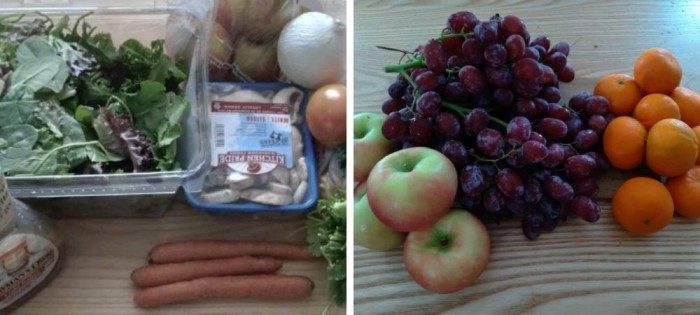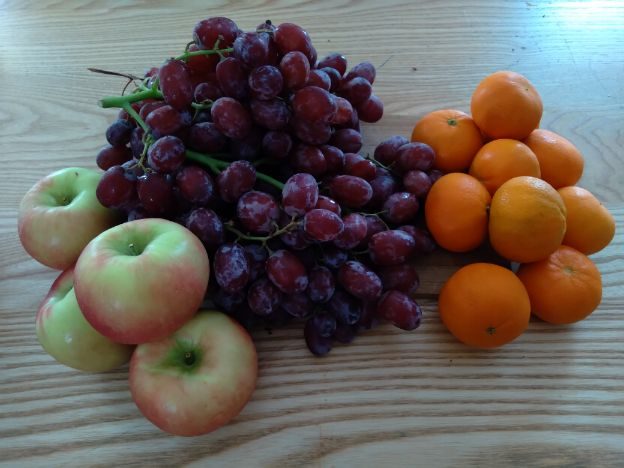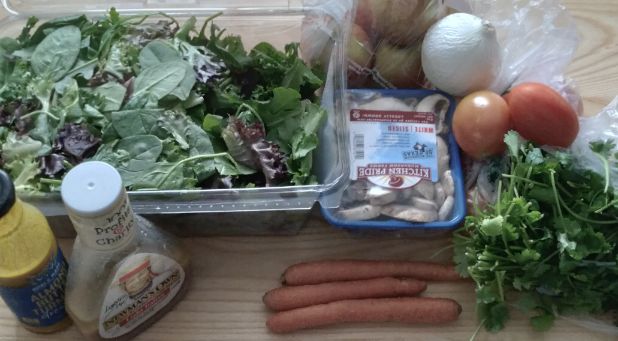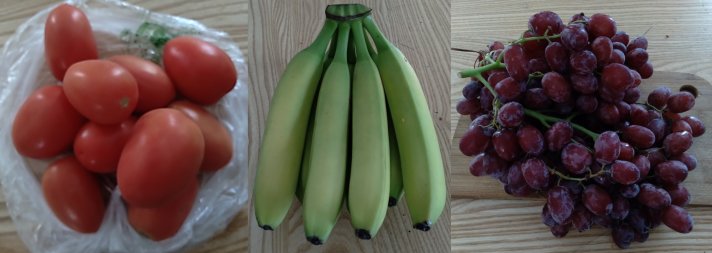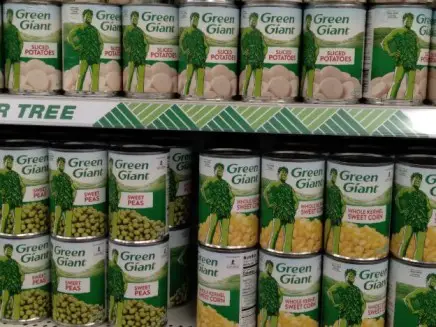Are you tired of feeling sluggish and putting on more weight than you’d like? If so, the 7-day fruit and vegetable diet may catch your interest. It’s got a lot of potential – it can jumpstart your weight-loss journey, cleanse your system, and help you learn how to enjoy eating healthy foods long-term.
At the same time, a 7-day fruit and vegetable cleanse diet isn’t for everyone. What’s more, you need to know how to do it right to get the best possible results. Let’s dig in to learn more about what this diet plan does and doesn’t offer.
What is the 7 Day Fruit and Vegetable Diet Plan?
This may sound counterintuitive, but you won’t just eat fruits and vegetables during your 7-day fruit and vegetable diet. Why? Simply put, it’s not good for you. Fruit has a high sugar content and eating too much of it in one sitting can cause digestive problems. What’s more, eating only fruits and vegetables weight loss results aren’t very impressive.
Without protein and even a bit of fat in your diet, the lipolysis process that helps your body melt fat breaks down. Instead of losing weight, you’ll retain it.
You simply can’t lose weight without eating foods from all the main food groups. That’s why just about every single effective fruit and vegetable diet plan includes some form of protein and in some cases additional starches. Additions to your fruit/vegetable diet will likely include:
- Dairy-based proteins (i.e. cheese, yogurt, and milk)
- Plant-based proteins (i.e. legumes, tofu, nuts)
- Eggs and/or lean white meat such as turkey, fish, and chicken
Some diets also add healthy starches such as brown rice, oats, and whole-grain bread. You won’t eat these every meal or even every day. However, adding small portions of these foods as needed can be a good idea, especially if you need to bring lunch to work.
Why Eat Fruits and Vegetables?
Dietary Guidelines for Americans state that adults should eat up to two cups of fruit and three cups of vegetables a day. However, only one out of ten Americans meet these requirements. That’s a shame because a diet rich in fruits and vegetables can also help prevent Diabetes type 2, heart problems, high blood pressure, osteoporosis, stroke, kidney stones, and even some types of cancer.
What’s more, fruits and vegetables are extremely rich in important nutrients you need to function properly. The main ones are:
- Carbohydrates. Fruits and vegetables have the energy your brain, nervous system, and other organs need to function properly
- Fiber. Fiber clears out your digestive tract, preventing constipation and other digestive problems. As an added bonus, it helps you feel full after eating so you don’t eat more than you should.
- Potassium. Many fruits and vegetables are rich in potassium, a nutrient your body needs to keep your muscles and nerves functioning properly.
- Vitamin A. This vitamin boosts your immune system and vision. It also promotes cell growth.
- Vitamin C. Vitamin C is best known for boosting your immune system but it does more than just that. It also keeps your teeth and gums healthy and repairs body tissue.
- Folate. Folate is a B-vitamin. It’s particularly important to pregnant women as it limits the risk of birth defects and helps form DNA. However, it’s not just for expecting moms. Folate also helps your body make new cells as needed.
These aren’t the only nutrients you’ll find in fruits and vegetables. Not by a long shot. Vegetables and fruit also contain calcium, iron, magnesium, folate, niacin, riboflavin, Vitamin K, antioxidants, and more.
The Advantages of a 7 Day Fruit and Vegetable Diet
Perhaps the biggest advantage of a 7 day fruit and vegetable diet is that it’s a great way to kickstart a long-term healthy eating plan. If you want to lose weight and keep it off, have more energy for day-to-day activities, and protect yourself from chronic conditions and sickness, a diet rich and fruits and vegetables is a must.
A seven-day diet that focuses primarily on these foods will help you learn new, healthy ways to prepare these foods. It will also give you the urge to try out new fruits and vegetables that you may not have used in your meal plans in the past.
Additionally, a diet rich in fruits and vegetables will clean out your digestive system from harmful toxins. You might not enjoy the frequent bathroom breaks but you will enjoy having a flatter stomach and a healthy body.
The Disadvantages of a 7 Day Fruit and Vegetable Diet
Perhaps the biggest problem with this diet is that it overemphasizes fruit and vegetable consumption. It’s great if you need a short-term diet but not ideal if you want a long-term healthy eating plan.
Another problem is the lack of variety and the time and effort it takes to prepare certain meals. You might get bored of making yourself a fruit/vegetable smoothie every day for breakfast and/or lunch.
What’s more, it takes time to prepare an appetizing fruit or vegetable salad, soup, baked potato and vegetable dish, and other meals.
Fruits and vegetables can be expensive, depending on where you live and what is in season when you start your diet. If you have a limited budget, you may not be able to get the variety you’d like.
This can lead to discouragement with the diet as you’re limited to preparing the same meals and snacks over and over again.
What do People Have to Say about the Seven Day Fruit and Vegetable Diet?
Sadly, it’s hard to find comments online from people who have tried the seven-day fruit and vegetable diet. Some people, like me (more on this below), simply don’t last a full seven days.
Others feel so good that they opt to extend their diets by several weeks. Those in the latter category report significant weight loss. The vegetable and fruit diet results before and after in this case, for instance, simply can’t be ignored.
I’d encourage you to try out the diet for at least a day to see how you feel. You won’t see immediate weight loss but you will feel healthier than before. Bloating disappears pretty quickly. You’ll feel hydrated as you drink lots of water in-between meals. You’ll feel energetic and empowered as you take control of your diet and make radical changes for the better.
What’s the Difference Between This Diet and a Regular Diet?
There are some similarities between a regular diet and a 7-day fruit and vegetable diet. Both diet plans disallow junk foods, soda, alcoholic beverages, and processed foods. Both diets also encourage you to drink plenty of water every day. However, there are also important differences between the two diet plans.
People who follow a regular diet plan often put a priority on counting calories. They’re always looking at labels and analyzing the fat content. They measure portions at mealtime to ensure they don’t eat too much. They’re often hungry because they’re eating far less than they used to.
What’s more, they don’t benefit from long-term weight loss because the body goes into “starvation mode” and holds onto fat instead of getting rid of it.
With a fruit and vegetable diet plan, you can feel free to eat large portions as fruits and vegetables won’t pack on the pounds. You won’t feel hungry because the high fiber content keeps you feeling full until your next snack or meal. You’ll have lots of energy as you are eating plenty of carbohydrates.
As an added benefit, the fruit and vegetable diet packs a nutritional punch you won’t get from just about any other diet.
It’s also worth pointing out that the fruit and vegetable diet isn’t just about losing weight. It’s about boosting your overall health and cleansing your system. Weight loss is an added benefit, not the end in itself. This factor makes the fruit and vegetable diet enjoyable rather than a chore.
It also helps to promote long-term eating habits. You’re not just focusing on a number on the scale but rather your overall health and appearance.
Who Is This Program For?
This diet isn’t for everyone. If you have a chronic health condition or are taking medication, talk to your doctor about your diet plans beforehand. A three to four-day fruit and vegetable diet may be a better option for you. Alternatively, you might need to find another way to add more fruits and vegetables to your daily meal plan.
Don’t do it if you’re pregnant, nursing, or thinking of getting pregnant in the near future. It’s not easy to get all the nutrients you need from this diet even if you do include protein, grains, and some fats.
What to Look Out For
There are some things you’ll need to watch out for as you embark on your fruit and vegetable diet. Number one, make sure you’re getting plenty of protein. Your body needs it, and there are plenty of healthy protein options to pick from. Number two, don’t dump the plan when you’re done.
Once you’ve discovered all the benefits of eating plenty of fruits and vegetables every day, make it a point to eat more fruits and vegetables for meals and snacks.
Number two, don’t eat too much fruit and too few vegetables. Your digestive system won’t be able to handle the massive fruit overload. Balance out your fruit and vegetable intake to make sure you’re getting “all the colors of the rainbow” in your diet.
Number three, stop the diet if you feel sick. If you continue to feel ill, talk to your doctor.
Frequently Asked Questions
What counts as “Fruits and Vegetables”?
This may seem like an odd question but it’s important to point out that some fruits and vegetables don’t have a place in the 7-day fruit and vegetable diet. These include:
- Canned fruits (They’re full of sugar)
- Dried fruit (You can eat them in moderation but regular fruits are better for the most part)
- Canned and frozen vegetables (raw vegetables are the most nutritious, with baked vegetables and vegetable soup being the next best options)
Should potatoes really count as a vegetable?
French fries and potato chips have no place in any diet. However, potatoes are definitely a vegetable and they’re actually very good for you. A single mid-size white potato has 28% of all the Vitamin C and 10% of all the iron you need for a whole day. A mid-size white potato also has 5 grams of protein and plenty of Vitamins A and E.
What if I don’t like fruits and vegetables?
There are so many fruits and vegetables to pick from that you should have no problem finding at least some foods you like. What’s more, you may find that preparing foods in new ways helps you enjoy fruits and vegetables you didn’t like previously. Personally speaking, I can’t stand avocado but I discovered that it taste great in a smoothie.
If you don’t like salad, try baked vegetables sprinkled with cheese or pick out a tasty salad dressing.
If citrus fruit is too acidic and messy for you, you can still eat apples, bananas, peaches, plums, strawberries, blueberries, etc.
A Sample 7-Day Diet Plan
This plan is only a sample. Feel free to adjust it to suit your needs and tastes.
Day 1:
Breakfast: Avocado smoothie
Lunch: Bowl of yogurt (plain, not sweetened) with the fruit of your choice.
Dinner: Vegetable soup
Day 2:
Breakfast: fruit salad with granola sprinkled on top. Eat with milk or yogurt.
Lunch: Vegetable salad with cubed chicken or cheese
Dinner: Casserole with baked potatoes and roasted vegetables. Add some chicken or cheese to the top for protein
Day 3:
Breakfast: Green smoothie
Lunch: Whole wheat crackers, cheese, and vegetable sticks
Dinner: Baked potatoes, a small helping of baked chicken or turkey, and vegetable salad
Day 4:
Breakfast: Fruit smoothie
Lunch: Vegetable salad with salmon (canned or baked)
Dinner: Cream cheese corn casserole
Day 5:
Breakfast: Granola with fruit and nuts
Lunch: Whole grain crackers, cheese, and avocado
Dinner: Baked sweet potato with vegetables. Add either cheese or chicken for protein
Day 6:
Breakfast: Fruit salad with yogurt and nuts
Lunch: Vegetable sticks, whole grain crackers, and boiled eggs
Dinner: Vegetable soup
Day 7:
Breakfast: Fruit/vegetable smoothie
Lunch: Whole grain crackers or bread with fruit and cheese kabobs
Dinner: Scrambled eggs with potatoes and the vegetables of your choice
My Results
I told you above that I tried the diet. To be honest, I only lasted a day. I didn’t see instant weight loss but I did feel pretty healthy when the day was done. I also discovered, to my surprise, that fruits and vegetables are pretty filling. I thought I would feel hungry, but I didn’t. For the record, I had avocado smoothies for breakfast and lunch, and vegetable soup for dinner.
Does it Work?
The 7-day fruit and vegetable diet results are real. You’ll feel healthier than before. You’ll lose weight if you stick to it for a whole week without “cheating”.
However, don’t expect long-term results if you don’t make long-term diet changes. You need to keep eating healthy to stay healthy. It’s a lot of hard work to eat right long-term but the results are more than worth the effort.
